At Monday night’s RTM meeting, the last before September, Item 28 was a Sense of the Meeting Resolution that originated in District 8.
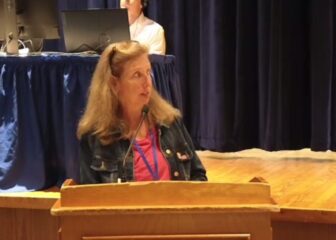
Warning of an upcoming “fiscal cliff,” D8 chair Cheryl Moss said the SOMR was a request to the BET and First Selectman to present to the full RTM at their September 15 meeting a detailed plan to adjust Greenwich’s capital plan and a proposal for a policy on budget guidelines for fiscal year 2026-2027 and future years to allow for all BET members to be involved in drafting the budget guidelines.
The BET has 12 members: six from each party. Currently the chair is a Republican (Harry Fisher) because at the last municipal election, Republicans had more votes overall – a situation that is unique to the BET and gives Mr. Fisher a tie breaking vote he often wields.
The SOMR was debated at length and after a motion to refer the SOMR back to D8 failed.
The vote on the SOMR passed:
107 In Favor
32 Opposed
11 Abstain
From the outset, RTM moderator Alexis Voulgaris explained that the SOMR was not required to be in legal order as it represented an opinion and was not legally binding.
“If this item were to come forward as a binding piece of legislation in the future, the proponents would have to tinker with it to make sure there are no conflicts,” Voulgaris said.
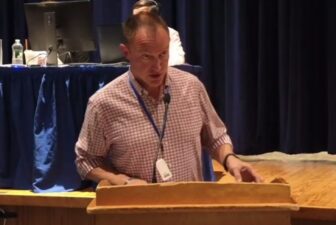
Committee reports started with James Waters, chair of the Budget Overview Committee who voted 8-3-1 in favor of the SOMR.
“The BOC largely agrees the town’s capital planning process is broken and requires urgent attention,” he said.
He said the SOMR was in addition to the efforts of a budget working group aiming to get the Capital Improvement Process back on track.
He said the working group included himself, the First Selectman, Town Administrator, BET Chair, Town Comptroller, CFO of Greenwich Public Schools, and the RTM Finance Committee chair, and is focused on instituting a better process to gather, prioritize, update and present capital projects to stakeholders.
“At the heart of the SOMR are three policy guidelines maintained and controlled by the BET, which are intended to keep the town on a sound financial footing, Waters said.
“They are (1) projects funded by taxes, currently set at a minimum of 10%, (2) debt limit as a percent of grand list currently set at a maximum of .75%, and (3) debt service as a percentage of budget, currently set at a maximum of 11%.”
Waters warned that, “Under the current capital financing model for the town, within 3 years, two of the three guidelines will be violated,” Waters warned. “Five years from now, it looks like all 3 will be violated.”
He said while the FY25-26 budget was in compliance, the capital model showed an upcoming period of non-compliance.
“Today’s capital model shows the town will have a hard time addressing upcoming capital items, absent significant changes,” he said listing upcoming projects that might not be funded: Riverside School or North Street renovations, the Hamill Rink replacement, the Grove Lane or West Brother brook drainage projects, the coastal resiliency plan, the flood protection improvements at Grass Island or other projects that might emerge, including replacement of the GHS swimming pool.
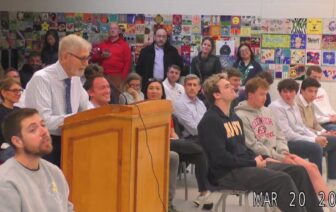
GHS boys swim team coach Terry Lowe spoke during the public comment portion of the March 20, 2025 BOE meeting.
Waters said three BET Republicans spoke against the SOMR at his BOC meeting, with one saying the RTM was “out of its lane.”
“Another encouraged the RTM to cut labor costs and capital projects, saying BOC members didn’t know what they were talking about,” he continued. “Finally, one BET member said the capital model isn’t accurate and will change, and that the BET debt policy committee hasn’t met in four or five years.”
The BOC voted in favor of the SOMR: 8-3-1.
Ms Moss said the SOMR was a move toward increasing transparency and creating a comprehensive policy on budget and capital planning.
“It was a a result of many Finance and BOC Committee meetings where members expressed the need for a better capital planning and financing strategy,” she said, adding that D8 voted unanimously, 16-0-0, in favor of the SOMR.
Moss said that at a joint committee meeting, D8’s Peter Cruikshank introduced an analysis showing how the capital tax levy debt payment and project funding interacted under the town’s 15-year capital plan.
“Primary concern was that the capital levy may not meet the BET’s affordability guidelines requiring at least 10% of capital projects be funded by taxes, especially from 2028 onward – the proverbial fiscal cliff!” she warned.
“These projects, such as the rink and flood hardening at Grass Island will have to be done and need to be included in the CIP. They should not be disappeared in order to make future budgets look fiscally plausible.”
Ms Moss noted Mr. Fisher had opposed the SOMR, citing conflicts with the town charter and procedural impracticalities, stating that the BET budget committee, not the full BET, handles initial guideline drafts, and that the BET had many levers to use to meet affordability guidelines, that September 15 would be too early, and changes in process would be disruptive to the BET.
Finance Committee chair Greg Zorthian said his committee felt an improved process was a good start, but the pace needed to be sped up. The vote was 6-3-3.
Dan Quigley, Land Use Committee chair, said, “The yes votes felt this sends a message that town capital planning has fallen into a sort of a reactionary mode, and although this is not binding it could send a signal that we would like the town to be more proactive and to have a better plan as we go forward with regard to capital spending.”
Land Use’s vote was 8-2-0.
Anthony Moor chair of the Transportation Committee said, “There is a broad sentiment in favor of a public accounting and members were satisfied that this SOMR urges the BET and the First Selectman to do just that.”
Transportation voted 10-0-0 in favor.

Alison Soler, chair of Health and Human Services committee, who voted 10-1-1 in favor of the SOMR, said Mr. Fisher joined her committee along with Democratic BET member Leslie Moriarty where they were asked why the Debt and Fund Balance Committees had not met.
“Mr. Fisher said existing policy does not require updates, so no meetings were held,” she said.
As for limiting debt to five years, she said, “Mr. Fisher said it was to minimize impacts and maintain pay-as-you-go policy, which has been in place for decades. And Ms Moriarty said extending the debt requires 7 votes on the BET, which has not been achieved.”
The HSS vote was 10-1-1 in favor.
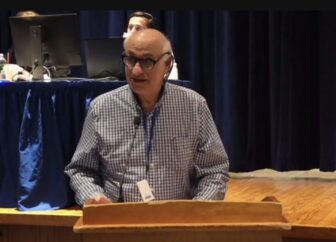
Steve Rubin, chair of the Education Committee said while many members of his committee expressed support for the concept and intent of the SOMR they felt it was too specific and included parts that were not obtainable.
They voted 10-1-1 to send the SOMR back to D8 to be simplified.
Josh Brown, the chair of Town Services Committee said the consensus was a better process was needed, but the vote was 2-4-4.
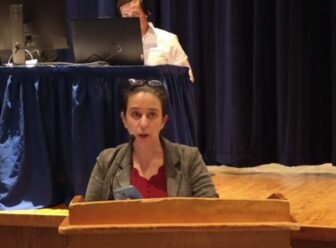
Katherine LoBalbo chair of Parks & Rec Committee noted her committee was uniquely impacted by capital projects, with two significant capital investments in the making for decades: Eastern Greenwich Civic Center and Hamill Rink.
Parks & Rec Committee voted 5-2-4 in favor of the SOMR.
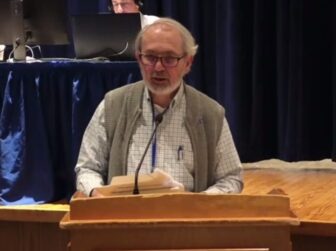
Kip Burgweger, chair of Legislative & Rules committee, said BET member Karen Fassuliotis had told his committee that the guidelines wouldn’t be completed until October or November, and most information about what will be in the budget isn’t available until January.
“Members expressed that removing projects that are known to be on the horizon from the capital plan is not a good practice,” he said, noting L&R voted 11-0-1 on legal order and 4-4-4 on merits.
Reporting on D8, Ms Moss said back in March her district became alarmed about a “ticking time bomb.”
“If anything, the Charter seems to require the First Selectman and BET to leave all those deleted projects in the 15-year plan,” Moss added. “We cannot continue to budget based on what is currently falling down…We cannot keep approving budgets and bonding with the knowledge it is leading us to a fiscal cliff.”
A motion from the Education Committee to refer the SOMR back to D8 failed:
The vote was 36-121-1.
Mr. Waters warned against kicking the can further down the road, and noted the SOMR had been approved by 6 RTM out of 9 committees.
Peter Cruikshank addressed two of the objections voiced in a document BET chair Harry Fisher sent to the RTM.
“The first objection is that there will be ‘no specific and detailed capital plan that can be given in September to anyone.’ I would argue that we have a capital plan. It was presented in May for a vote. It has 14 future years laid out in detail. All our Finance Dept would need to do is tack on a 15th year. They can model it.”
He said next steps would be for the BET chair to select some BET members to work on this model review and meet with the First Selectman, Town Administrator, Greenwich Schools Superintendent, Board of Education CFO and administrator with the goal of determining which of the $142 million in capital projects the BET removed from the plan should be added back to the 15-year plan.
“Again, $142 million were removed. Tell us specifically in September which of the projects were added back, so we will know,” Cruikshank said.
Cruikshank said the BET should welcome public input into their draft guidelines.
“That’s just good governance,” he added.
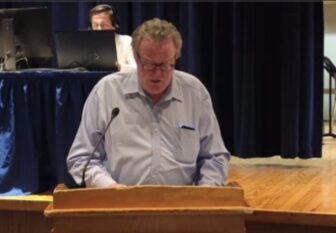
Republican chair of the BET, Harry Fisher pushed back, saying the SOMR asked for steps that are not in the town Charter.
“The Charter describes the budget process and timeline. The RTM is not involved until the BET completes their work in the spring.”
He added that while the BET can have more frequent discussions with the RTM Finance and BOC committees, the BET already had a solid committee structure that functions well.
“It would be extremely inappropriate for the RTM to require that the full BET be involved, and in fact it is involved. A public hearing at that stage of the process also is inappropriate,” Fisher continued.
Fisher said the new committee had been formed at the instigation of himself and the chairs of the BOC and Finance committees to look at the entire budget process, not just capital.
“It should be given latitude to do its work,” Fisher said.
Lastly he said the SOMR would be disruptive to the proper order of the Town.
“We’ve always had and always will have large projects,” Fisher said. “We’re not kicking the can down the road.”
Lastly he said the capital plan was the responsibility of the First Selectman, not the BET.
“It’s in our budget for information purposes only,” he added.
First Selectman Fred Camillo agreed with Mr. Fisher that the SOMR conflicted with the Town Charter.
“When I came into office in December 2019 we all ran on a vision and a record. The vision was vetted by the voters and it’s frustrating for me to put things in (the budget) that people wanted and then it gets pushed down the road. We did go from a 15-year capital plan to a 5-year capital plan.”
He said public-private partnerships have worked and that the Town works hard to obtain grant money.
As for the working group mentioned earlier, Camillo said, “I expect you’ll have some solid recommendations coming out of that.”
Anthony Moor said objections about the SOMR not being in legal order and there not being enough time were ‘red herrings.’
“There is an old adage that says a failure to plan is a plan for failure. And that’s the only plan we have now in Greenwich. As the First Selectman just said, long ago we gave up on 15-year budget planning. Now we don’t even do five-year budget planning well.”
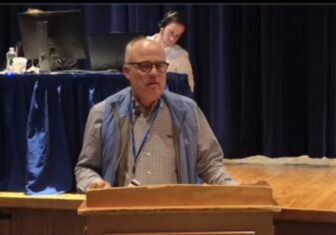
Craig Chapman from District 8 warned of an approaching “fiscal cliff” in Greenwich.
“If we were a public company, a response that Mr. Fisher gave, he’d be booted out of office. Being transparent, understanding the context in which the town is operating is important. Until I became a member of the RTM less than two years ago I had no idea about the fiscal cliff we’re talking about.”
Mr. Chapman said the BET and First Selectman ought to put together a plan to help the town manage capital expenditures going forward and understand how they will be paid for, not just for governance of the town, but for residents who pay taxes in Greenwich.
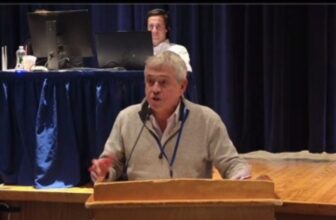
State Rep Hector Arzeno (D-151) also supported the SOMR.
“What a powerful message we will send to our elected officials. We need action and we want transparency. We want answers. We deserve here in the RTM and across town to know why and how we’ll make the necessary corrections and we deserve to know in detail the 15-year capital plan and how we’ll finance it. Please act.”

BET Democrat Scott Kalb said the SOMR would send a signal to the BET.
“It calls for greater transparency and more collaboration,” he said.
Kalb said BET Democrats had not been consulted when the Republicans wrote the budget guidelines, and no vote was held in the Budget Committee to approve them.
“In my experience, we have six individuals on the Republican side of the BET who have an agenda, and they are deciding what is best for our town’s finances and the quality of life of our townspeople.”
Kalb continued, “They financed the budget with hastily adopted spending cuts, with little thought to the consequences. For the last two years our Republican colleagues have delivered 54 pages of spending cuts to the Democratic colleagues the day before the final vote was to be held on the budget. That’s not long-term planning.”
Mr. Kalb said Republicans on the BET had removed $150 million of essential capital projects from the budget, including the sewer plan, approved Riverside School renovations and Hamill Rink.
“What you should be asking is what’s happening to these projects,” Kalb added.
Before the vote, moderator Ms Voulgaris said the SOMR from D8 “policy for budget guidelines” did not require a second read.
The vote on item 28 passed:
107 in favor
32 opposed
11 abstaining
After the meeting…
On Tuesday Mr. Fisher used the all 230-member RTM email to comment on the number of members who participated in the SOMR vote.
“The vote on the BET sense of the meeting resolution was 107-31-11 107 is less than half the full membership of the RTM.”
In response, Aaron Leonard from D12 replied through the RTM email:
“Mr. Fisher’s comment is deeply troubling. As someone who would stand for public office, that he would be so dismissive of the democratic process is chilling. The fact that he is the Chair of the BET is due to simple majority, does he intend to give up the Chair if the party with the most BET votes is not by some overwhelming majority? I suspect not.”
Ms Voulgaris had the last word, through the all-230 RTM email, she wrote, “…the Town Charter defines a quorum as one-third (77 members) of the total membership.”
“The inference that a main motion, that fails to receive an affirmative vote by a majority of the full membership (meaning at least 116 “yes” votes), is somehow less valid, is patently false and reflects a poor understanding of proper parliamentary process as well as the Charter provisions that govern the RTM.”
Voulgaris noted that the vote – 107-32-11 – reflected more than the required quorum.
“…and those that cast a vote overwhelmingly voted in favor of the item.”
See also:
June 11, 2025